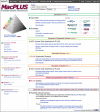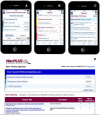Increasing the quantity and quality of searching for current best evidence to answer clinical questions: protocol and intervention design of the MacPLUS FS Factorial Randomized Controlled Trials
- PMID: 25239537
- PMCID: PMC4177052
- DOI: 10.1186/s13012-014-0125-9
Increasing the quantity and quality of searching for current best evidence to answer clinical questions: protocol and intervention design of the MacPLUS FS Factorial Randomized Controlled Trials
Abstract
Background & aims: Finding current best evidence for clinical decisions remains challenging. With 3,000 new studies published every day, no single evidence-based resource provides all answers or is sufficiently updated. McMaster Premium LiteratUre Service--Federated Search (MacPLUS FS) addresses this issue by looking in multiple high quality resources simultaneously and displaying results in a one-page pyramid with the most clinically useful at the top. Yet, additional logistical and educational barriers need to be addressed to enhance point-of-care evidence retrieval. This trial seeks to test three innovative interventions, among clinicians registered to MacPLUS FS, to increase the quantity and quality of searching for current best evidence to answer clinical questions.
Methods & design: In a user-centered approach, we designed three interventions embedded in MacPLUS FS: (A) a web-based Clinical Question Recorder; (B) an Evidence Retrieval Coach composed of eight short educational videos; (C) an Audit, Feedback and Gamification approach to evidence retrieval, based on the allocation of 'badges' and 'reputation scores.' We will conduct a randomized factorial controlled trial among all the 904 eligible medical doctors currently registered to MacPLUS FS at the hospitals affiliated with McMaster University, Canada. Postgraduate trainees (n=429) and clinical faculty/staff (n=475) will be randomized to each of the three following interventions in a factorial design (AxBxC). Utilization will be continuously recorded through clinicians’ accounts that track logins and usage, down to the level of individual keystrokes. The primary outcome is the rate of searches per month per user during the six months of follow-up. Secondary outcomes, measured through the validated Impact Assessment Method questionnaire, include: utility of answers found (meeting clinicians’ information needs), use (application in practice), and perceived usefulness on patient outcomes.
Discussion: Built on effective models for the point-of-care teaching, these interventions approach evidence retrieval as a clinical skill. If effective, they may offer the opportunity to enhance it for a large audience, at low cost, providing better access to relevant evidence across many top EBM resources in parallel.
Trial registration: ClinicalTrials.Gov NCT02038439.
Figures




Similar articles
-
Translating Clinical Questions by Physicians Into Searchable Queries: Analytical Survey Study.JMIR Med Educ. 2020 Apr 20;6(1):e16777. doi: 10.2196/16777. JMIR Med Educ. 2020. PMID: 32310137 Free PMC article.
-
The future of Cochrane Neonatal.Early Hum Dev. 2020 Nov;150:105191. doi: 10.1016/j.earlhumdev.2020.105191. Epub 2020 Sep 12. Early Hum Dev. 2020. PMID: 33036834
-
The effectiveness of internet-based e-learning on clinician behavior and patient outcomes: a systematic review protocol.JBI Database System Rev Implement Rep. 2015 Jan;13(1):52-64. doi: 10.11124/jbisrir-2015-1919. JBI Database System Rev Implement Rep. 2015. PMID: 26447007
-
Sutureless Aortic Valve Replacement for Treatment of Severe Aortic Stenosis: A Single Technology Assessment of Perceval Sutureless Aortic Valve [Internet].Oslo, Norway: Knowledge Centre for the Health Services at The Norwegian Institute of Public Health (NIPH); 2017 Aug 25. Report from the Norwegian Institute of Public Health No. 2017-01. Oslo, Norway: Knowledge Centre for the Health Services at The Norwegian Institute of Public Health (NIPH); 2017 Aug 25. Report from the Norwegian Institute of Public Health No. 2017-01. PMID: 29553663 Free Books & Documents. Review.
-
Interventions to increase the use of electronic health information by healthcare practitioners to improve clinical practice and patient outcomes.Cochrane Database Syst Rev. 2015 Mar 14;2015(3):CD004749. doi: 10.1002/14651858.CD004749.pub3. Cochrane Database Syst Rev. 2015. PMID: 25770311 Free PMC article. Review.
Cited by
-
Online Platform as a Tool to Support Postgraduate Training in General Practice - A Case Report.GMS J Med Educ. 2017 Nov 15;34(5):Doc59. doi: 10.3205/zma001136. eCollection 2017. GMS J Med Educ. 2017. PMID: 29226227 Free PMC article.
-
Translating Clinical Questions by Physicians Into Searchable Queries: Analytical Survey Study.JMIR Med Educ. 2020 Apr 20;6(1):e16777. doi: 10.2196/16777. JMIR Med Educ. 2020. PMID: 32310137 Free PMC article.
-
Development of a Search Strategy for an Evidence Based Retrieval Service.PLoS One. 2016 Dec 9;11(12):e0167170. doi: 10.1371/journal.pone.0167170. eCollection 2016. PLoS One. 2016. PMID: 27935993 Free PMC article.
-
Use of Tablet Computers to Promote Physical Therapy Students' Engagement in Knowledge Translation During Clinical Experiences.J Neurol Phys Ther. 2016 Apr;40(2):81-9. doi: 10.1097/NPT.0000000000000123. J Neurol Phys Ther. 2016. PMID: 26945431 Free PMC article.
References
-
- Gialamas A, Yelland LN, Ryan P, Willson K, Laurence CO, Bubner TK, Tideman P, Beilby JJ. Does point-of-care testing lead to the same or better adherence to medication? A randomised controlled trial: the PoCT in General Practice Trial. Med J Aust. 2009;191:487–491. - PubMed
Publication types
MeSH terms
Associated data
Grants and funding
LinkOut - more resources
Full Text Sources
Other Literature Sources

